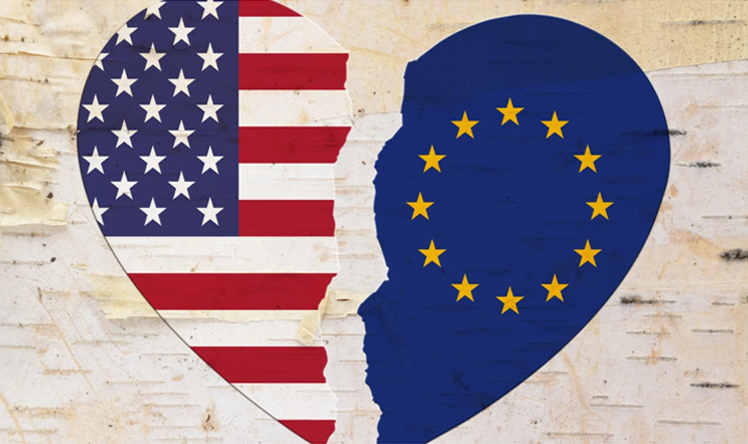The tirade that erupted in the Oval Office between Donald Trump and Volodymyr Zelenskyy was more than just a diplomatic incident – it was a crystallization of America’s rapid dismantling of the postwar global order. As European leaders rushed to express solidarity with Ukraine’s president, their words carried the unmistakable whiff of a political eulogy. The stark reality is that Trump’s America has fundamentally altered the rules of international relations, and Europe now finds itself uncomfortably alone in its posture toward Russia and the broader geopolitical landscape.
The question is no longer whether the US will throw its allies under the bus – that process is already underway – but whether Europe has the capacity, unity and strategic vision to navigate this new terrain. For all the talk of European strategic autonomy and self-reliance over the past decade, the continent appears woefully unprepared for the post-American world that has arrived sooner than expected.
The End of the Western Alliance
Never has there been a US president more truthful to the public than Donald J. Trump. Never does he dress up his intentions with blandishments such as freedom and democracy. Where his predecessors spoke of values and alliances, Trump speaks plainly of interests and deals. The world, according to Trump, is one where great powers compete for wealth and riches, where spheres of influence stabilize and cushion conflict, and where one power encroaching on the borders of another heightens the risk of war.
This worldview explains why Putin’s cause in Ukraine has a certain legitimacy in Trump’s eyes and why Zelenskyy, the Europeans, and the US Democratic Party are cast as aggressors and warmongers who need reining in. It’s also why leaders across the non-Western world – China’s Xi, India’s Modi, Turkey’s Erdogan, and Saudi Arabia’s Bin Salman – harbour sympathy for Russia. The European portrayal of Putin as the new Hitler, the epitome of evil and moral insanity, is not shared globally. With America now aligning with this position, Europe stands ever more isolated.
The notion of the ‘free world’ that US presidents once championed has been overtaken by a world in which the rules of empire and dominion determine what is right and wrong. Europe can continue to register dissent, threaten countries with sanctions and international courts, and refuse to deal with autocrats, but the world is moving on regardless. Even before sanctions are formally lifted, Kremlin officials are luring US businesses back to Russia. Once Trump secures his peace deal, he will encourage them to return.
Europe’s Strategic Naivety
There’s something profoundly naive about European leaders’ response to America’s great decoupling. When EU foreign policy chief Kaja Kallas tweeted that “the free world needs a new leader” and that “it is now up to us, Europeans, to take this challenge,” she revealed the depth of Europe’s delusions. At this moment, the best-case scenario for Europe is quite simply survival – maintaining its sovereignty, retaining its freedoms, and not dissolving into disparate parts.Europeans have been dependent on the US for their foreign policies and geopolitical moves since World War II, and now they do not know what to do that’s why they are sounding geopolitically noob.
Europe’s diplomatic backseat driving – supporting Ukraine financially, militarily, and morally without defining its ownplan or interests for fear of disunity – has left it strategically adrift. This approach may have helped maintain sanctions pressure on Moscow and military aid to Kyiv, but the cost has been an absence of strategy in anticipation of Trump’s second term and a clear policy to bolster morale among war-weary voters who have been turfing out governments they associate with high wartime inflation and a weak economy.
European leaders appear to have assumed the early wave of public support for Ukraine would last indefinitely, much like the applause for healthcare workers during the COVID-19 pandemic. Instead, across many countries, backing for a ceasefire in exchange for territorial concessions has grown. Financial markets are already taking Trump’s cue and betting on the rewards, including falling energy prices.
EU diplomats worry that years of talking about a more assertive Europe have led to complacency, comparing it to repeatedly ignored calls for retirement saving. Initiatives like the broader European Political Community or opening EU accession talks with Ukraine have failed to change the fundamental strategic calculus.
The Economic Reality
The economic implications of America’s retreat from its alliance commitments are profound. While the US accounts for less than 3% of the European Union’s GDP in direct exports, the ripple effects of Trump’s proposed 25% tariff on EU goods would be far-reaching. The German car industry is already struggling with low European demand and competition from China; additional barriers to the US market would compound these challenges.
Yet some European industries are finding opportunity amid the turmoil. Defense companies like Hensoldt and Rheinmetall are experiencing booming order books, even offering to take on workers laid off by automotive suppliers. This pivot offers a glimmer of hope – protecting jobs and industrial capacity as access to US markets shrinks, while simultaneously building Europe’s ability to defend itself.
The question is whether these isolated adaptations can combine into a coherent economic strategy. Europe’s budgets are strained by the need to ramp up defence spending, both to support Ukraine and to compensate for America’s security withdrawal. Even optimistic assessments suggest it will take nearly a decade before the continent’s own defence capacity can match the protection currently offered by the US, excluding its nuclear deterrent.
Cultural Decoupling
Beyond economics and security, Trump’s policies are accelerating a cultural decoupling. Artists are cancelling US tours, academics are fleeing American universities for positions in Europe, and creative industries are bracing for funding cuts. The hit to America’s creative sector is likely to benefit Britain and Europe, as international visitors redirect their tourism away from the US.
This cultural shift may seem peripheral, but it speaks to a deeper realignment of global soft power. As Trump freezes budgets for museums, galleries, and libraries, and targets diversity initiatives, international perceptions of America are changing. London, Berlin, and Paris are positioning themselves as “refuge cities” for American artists and thinkers, potentially enriching their own cultural landscapes.
Europe’s Hard Choices
With their charm offensive towards Trump in tatters, European leaders now face difficult choices. They can dig in and continue unwavering support for Ukraine, insofar as Zelenskyy wishes to carry on the fight – a path that Trump warned “is not going to be pretty.” Or they can begin to prepare for the post-Western world that is already here, starting by telling Zelenskyy to accept a Trump-led peace deal, even if this leaves Ukraine neutral, outside the EU, and more vulnerable to future Russian incursions.
But that’s not where Europe’s challenges end. If Russia obtains a neutralized Ukraine, Europe must ensure this is as far as Moscow’s ambitions can reach – not one inch further west. This requires building a credible deterrence capacity, something that demands massive public investment, consolidation of Europe’s defence industry, and the creation of a European command structure, either inside or outside NATO.
Furthermore, as the notion of the West becomes politically meaningless, Europeans need to reassess their strategic relationships globally. However distasteful it may be, once a peace deal is in place for Ukraine, that includes restoring diplomatic ties with Moscow. Evidently, this is not something that can be left to Washington.
For the moment, restoring such ties remains Europe’s greatest taboo. Instead, the EU is occupied with creating a “Special Tribunal for the Crime of Aggression Against Ukraine.” Such tribunals are typically established by victors to hold the defeated accountable, but Putin is not going to lose this war. Europe’s moment of justice and retribution will not come. Moscow will emerge strengthened from Trump’s peace deal, reintegrate into the world economy, and benefit from partnerships with Washington and Beijing.
Beyond Trans-Atlanticism
As American security guarantees disappear, Europeans should view this moment as an opportunity to reforge struggling policies, particularly toward China. This begins by grounding policy in European strategic interests, not those of the United States or “the West.” During the Biden years, Europeans were pressured into adopting US export controls and economic statecraft targeting Beijing. That pressure has now vanished. Should the US become embroiled in conflict with China, it will not be the West’s or NATO’s war – it will be America’s alone.
It will be painful for Europe to let go of 80 years of trans-Atlanticism. We have known for some time that America’s commitment to the post-1945 order was waning, yet Europeans preferred to look away, clinging to the vestiges of that system. Hope springs eternal. It was always going to take a US president of exceptional brutality to shatter Europe’s illusions. In Donald Trump, that president has arrived.
Building a European Strategy
If Europe is to thrive – or even survive – in this new world, it must move beyond outraged demands for a seat at Trump and Putin’s table. Such assertions only reinforce US perceptions that Europeans are followers, as unprepared for peace as they were for war.
The time has come for Europeans to set aside pan-EU consensus-building and forge nimbler coalitions. A grouping of the UK, France, Germany, Italy, and Poland would bring together Europe’s two nuclear powers, its biggest economy, an influential Trump-compatible government, and its biggest defence spender relative to GDP.
The EU must also make a concerted push on defence – its greatest weakness and the biggest point of contention with Washington – to demonstrate it can act strategically without American direction. This means avoiding both a German-centered debate about money and a French-centered debate about leadership. Maximum flexibility is important: EU budget rules could be relaxed, crisis-era bailout funds repurposed, and more borrowing should brought for initiatives like air defence. However, this is not going to be easy and will take years.
Conclusion: Readiness or Delusion?
So, is Europe ready for a post-American world order? The evidence suggests not. The continent remains divided, strategically adrift, and psychologically unprepared for the brutal geopolitical realities that Trump’s presidency has unveiled. European leaders continue to indulge in moral posturing when power politics demands pragmatism and clear-eyed recognition of interests. It would be fair to say that European leaders are not habitual in recognizing their interests due to their dependency on the US, and learning will need a lot of time and experience.
Yet Europe is stronger than it appears. The German electronics firm Hensoldt’s burgeoning order book, the academic exodus from America to European universities, and the gradual recognition among some leaders of the need for strategic autonomy – these are all green shoots of European resilience.
The greatest barrier to European readiness is not material but psychological – the inability to accept the postwar order. Europe has to understand that its American security umbrella and the rules-based international system are truly over. Only when European leaders internalize this reality can they begin to forge the alliances, policies, and capabilities needed to navigate the post-Western world.
Europe has good reason to worry about the outcome of Trump-Putin talks. But more than a quarter-century after the EU set off on its own geopolitical path, America First cannot simply mean Europe as Usual. The question now is whether Europe can transform its outrage into strategy before the post-American world order solidifies around it.




